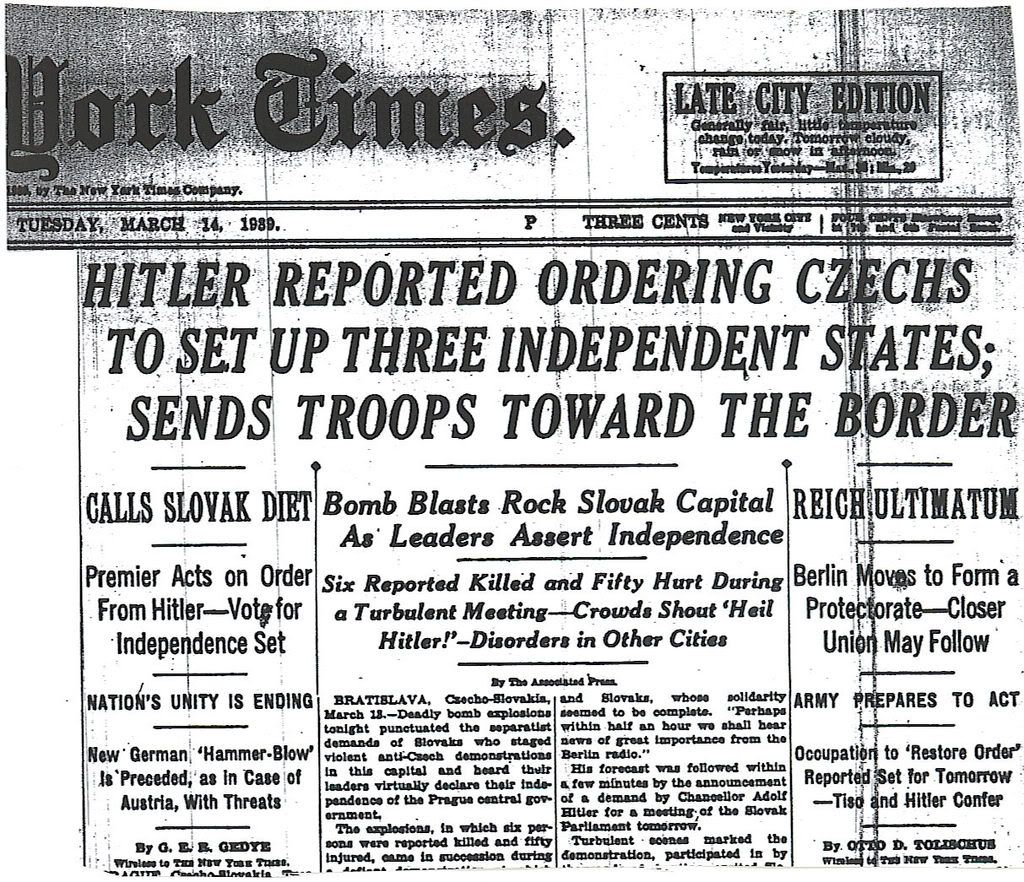
Posted on 03/14/2009 6:47:16 AM PDT by Homer_J_Simpson

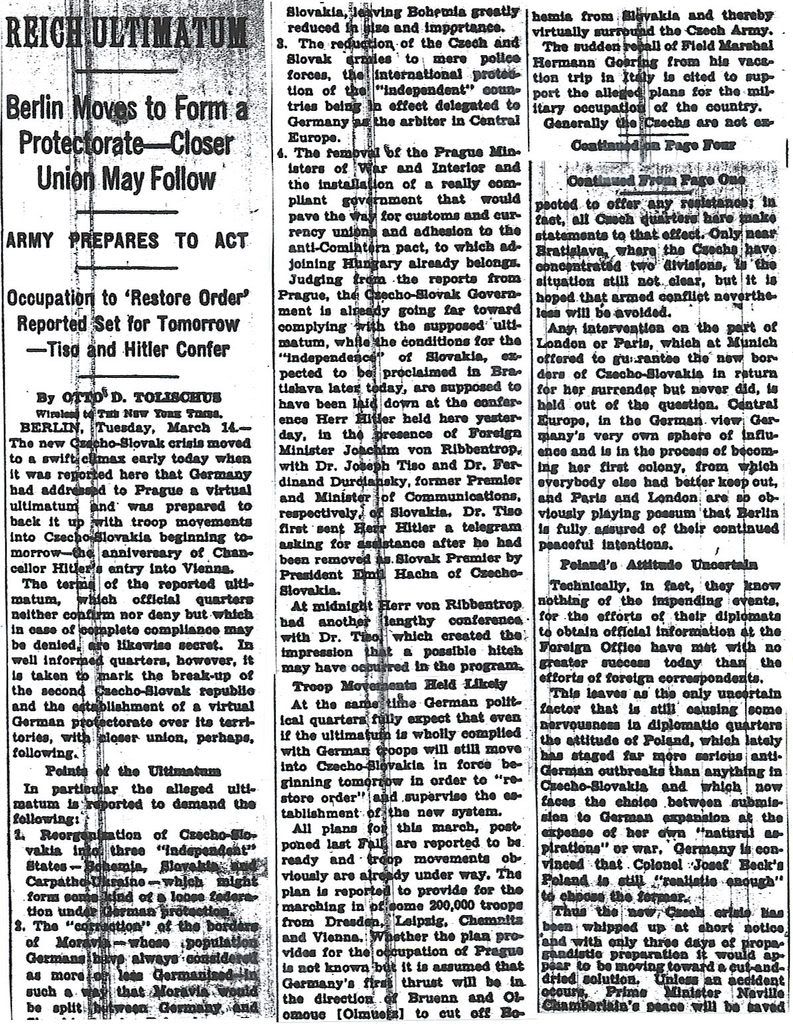
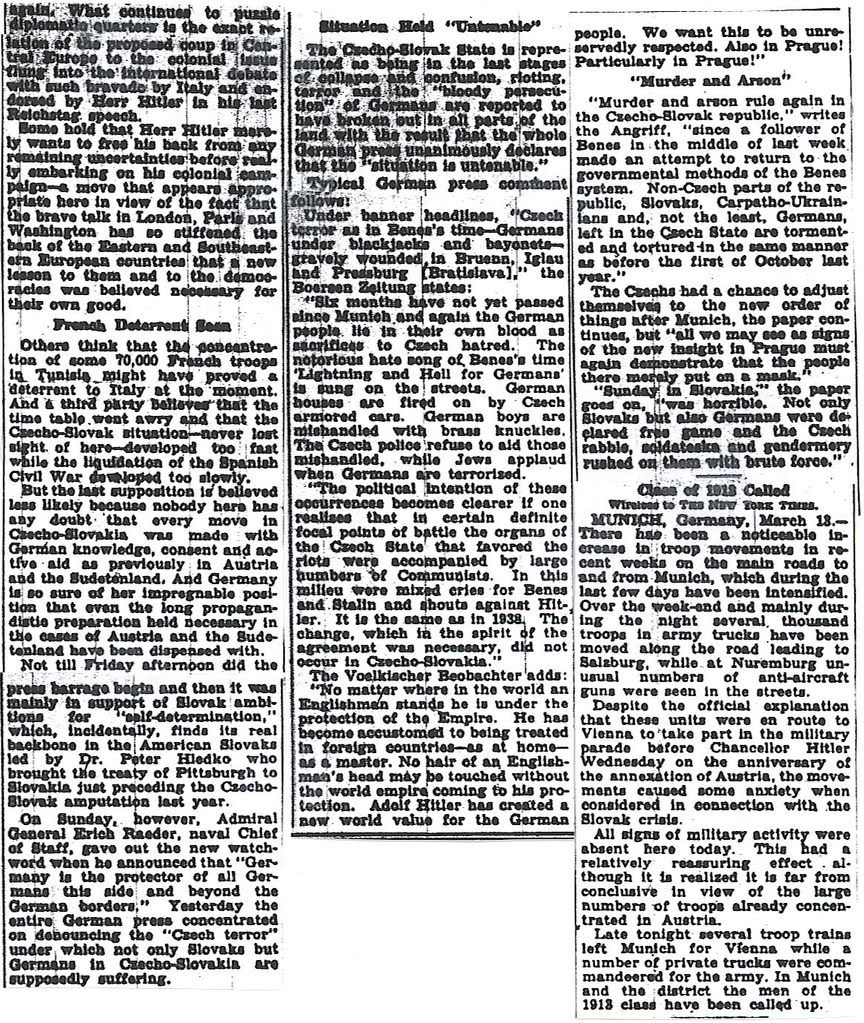
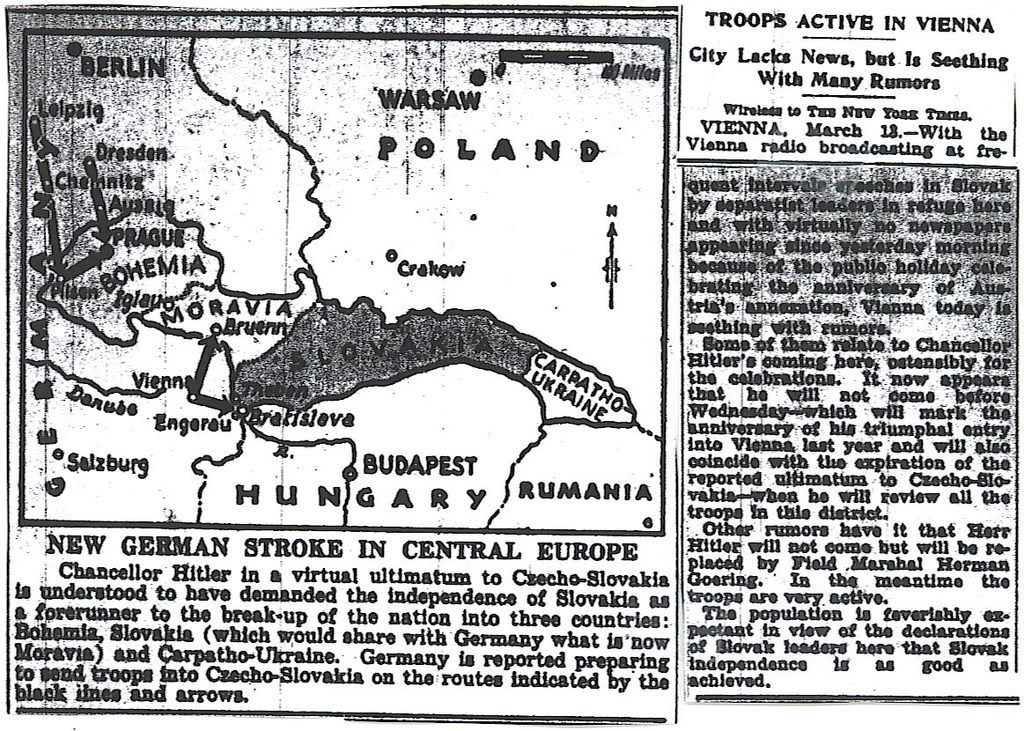
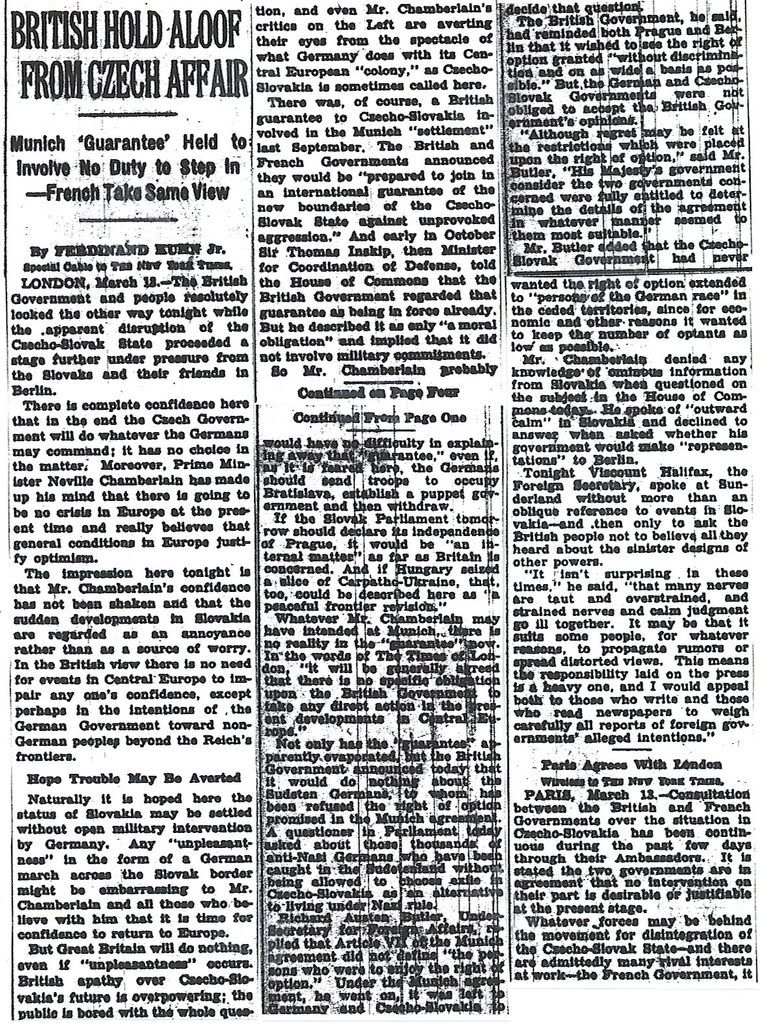
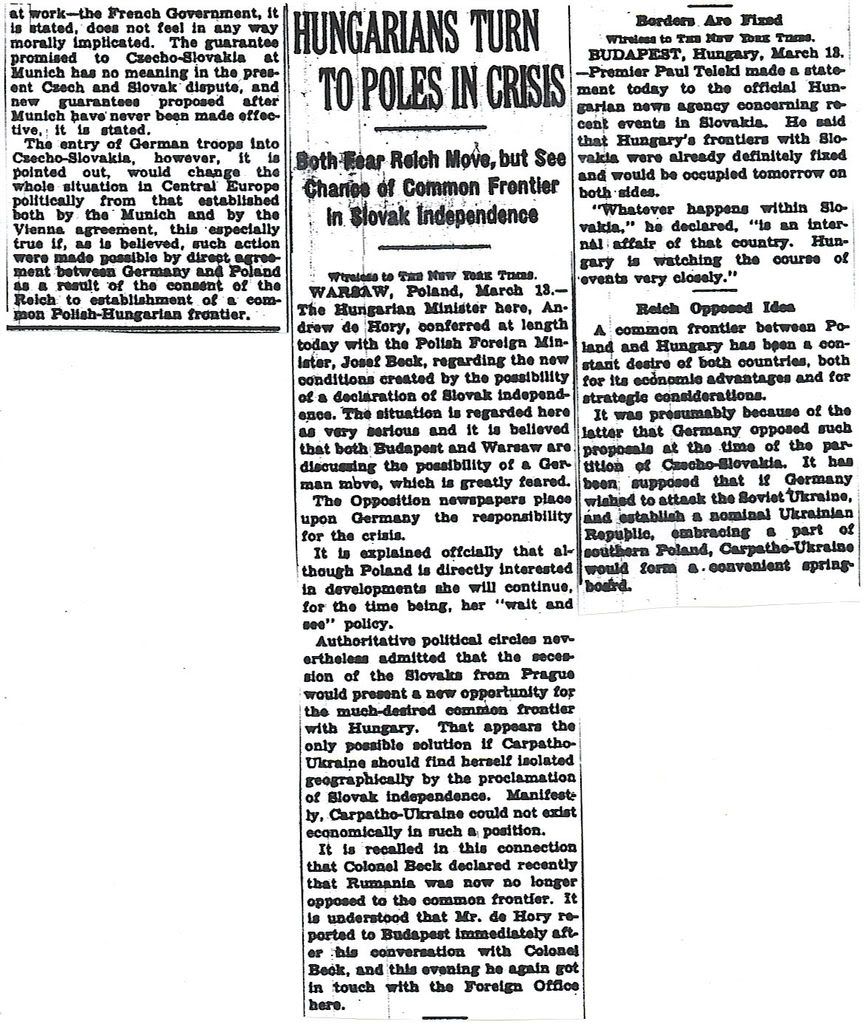
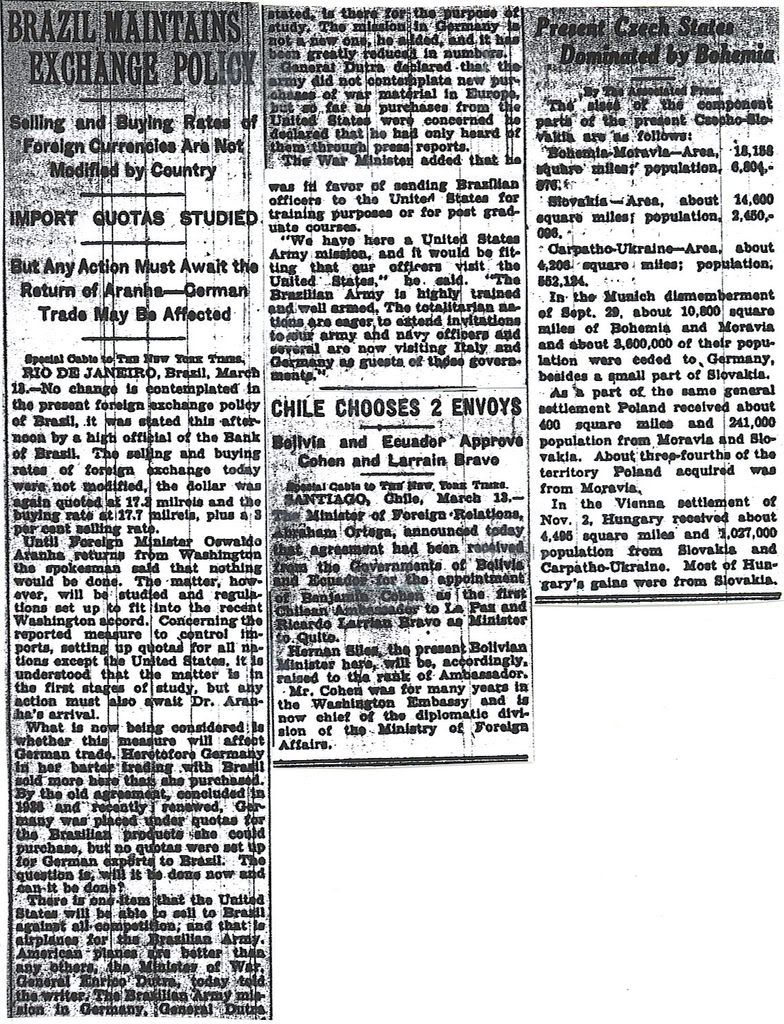
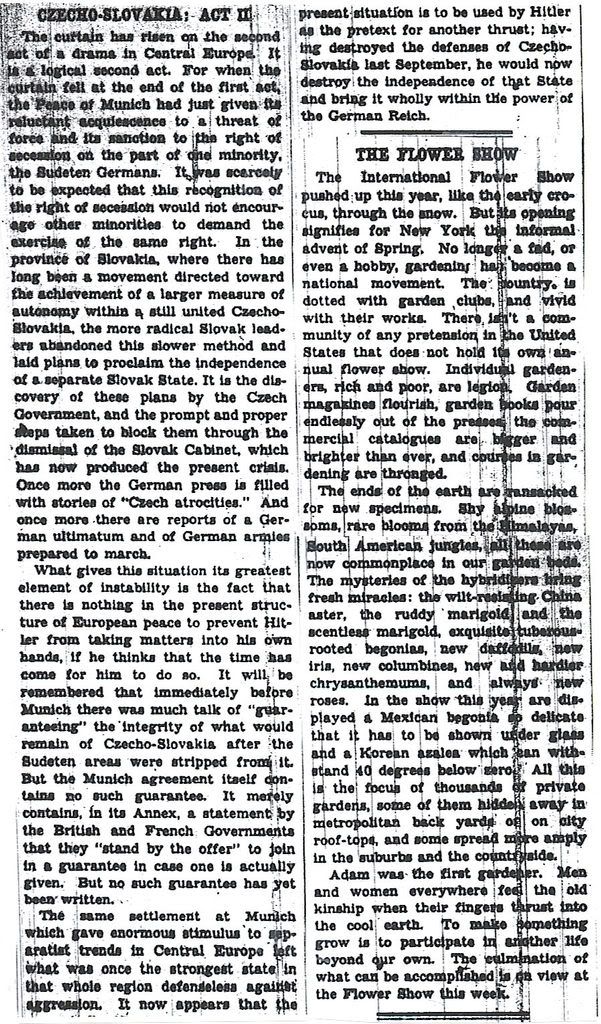
At the Foreign Office that night Ribbentrop also drafted the Slovak proclamation of "independence" and had it translated into Slovak in time for Tiso to take it back to Bratislava, where the "Premier" read it—in slightly altered form, as one German agent reported—to Parliament on the following day, Tuesday, March 14. Attempts by several Slovak deputies to at least discuss it were squelched by Karmasin, the leader of the German minority, who warned that German troops would occupy the country if there was any delay in proclaiming independence. Faced with this threat the doubting deputies gave in.
Thus was "independent" Slovakia born on March 14, 1939. Though British diplomatic representatives were quick to inform London as to the manner of its birth, Chamberlain, as we shall see, was just as quick to use Slovakia's "secession" as an excuse for Britain not to honor its guarantee of Czechoslovakia after Hitler, on that very evening, March 14, acted to finish what had been left undone at Munich.
The life of the Czechoslovak Republic of Masaryk and Benes had now run out. And once again the harassed leaders in Prague played into Hitler's hands to set up the final act of their country's tragedy. The aging, bewildered President Hacha asked to be received by the Fuehrer. Hitler graciously consented. It gave him an opportunity to set the stage for one of the most brazen acts of his entire career.
Consider how well the dictator had already arranged the set as he waited on the afternoon of March 14 for the President of Czechoslovakia to arrive. The proclamations of independence of Slovakia and Ruthenia, which he had so skillfully engineered, left Prague with only the Czech core of Bohemia and Moravia. Had not Czechoslovakia in reality ceased to exist—the nation whose frontiers Britain and France had guaranteed against aggression? Chamberlain and Daladier, his partners at Munich where the guarantee had been solemnly given, already had their "out," That they would take it he had no doubt—and he was right. That disposed of any danger of foreign intervention. But to make doubly sure—to see to it that his next move looked quite legal and legitimate by the vague standards of international law, at least on paper—he would force the weak and senile Hacha, who had begged to see him, to accept the very solution which he had intended to achieve by military force. And in so doing he could make it appear—he, who, alone in Europe, had mastered the new technique of bloodless conquest, as the Anschluss and Munich had proved—that the President of Czechoslovakia had actually and formally asked for it. The niceties of "legality," which he had perfected so well in taking over power in Germany, would be preserved in the conquest of a non-Germanic land.
Hitler had also set the stage to fool the German and other gullible people in Europe. For several days now German provocateurs had been trying to stir up trouble in various Czech towns, Prague, Bruenn and Iglau. They had not had much success because, as the German Legation in Prague reported, the Czech "police have been instructed to take no action against Germans, even in cases of provocation." But this failure did not prevent Dr. Goebbels from whipping up the German press into a frenzy over invented acts of terror by the Czechs against the poor Germans. As the French ambassador, M. Coulondre, informed Paris, they were the same stories with the same headlines which Dr. Goebbeis had concocted during the Sudeten crisis—down to the pregnant German woman struck down by Czech beasts and the general Blutbad" ("blood bath") to which the defenseless Germans were being subjected by the Czech barbarians. Hitler could assure the proud German people that their kinsmen would not remain unprotected for long.
Such was the situation and such were Hitler's plans, we now know from the German archives, as the train bearing President Hacha and his Foreign Minister, Chvalkovsky, drew into the Anhalt Station in Berlin at 10:40 on the evening of March 14, Because of a heart condition the President had been unable to fly.
The German protocol was perfect. The Czech President was accorded all the formal honors due to a head of state. There was a military guard of honor at the station, where the German Foreign Minister himself greeted the distinguished visitor and slipped his daughter a fine bouquet of flowers. At the swank Adlon Hotel, where the party was put up in the best suite, there were chocolates for Miss Hacha—a personal gift of Adolf Hitler, who believed that everyone else shared his craving for sweets. And when the aged President and his Foreign Minister arrived at the Chancellery he was given a salute by an S.S. guard of honor.
They were not summoned to Hitler's presence until 1:15 A.M. Hacha must have known what was in store for him. Before his train had left Czech territory he learned from Prague that German troops had already occupied Moravska-Ostrava, an important Czech industrial town, and were poised all along the perimeter of Bohemia and Moravia to strike. And he saw at once, as he entered the Fuehrer's study in the early-morning hour, that, besides Ribbentrop and Weizsaecker, Field Marshal Goering, who had been urgently recalled from his holiday at San Remo, and General Keitel stood at Hitler's side. Most probably, as he went into this lion's den, he did not notice that Hitler's physician, the quack Dr. Theodor Morell, was on tap. But the doctor was, and for good reason.
The secret German minutes of the meeting reveal a pitiful scene at the very outset. The unhappy Dr. Hacha, despite his background as a respected judge of the Supreme Court, shed all human dignity by groveling before the swaggering German Fuehrer. Perhaps the President thought that only in this way could he appeal to Hitler's generosity and save something for his people; but regardless of his motive, his words, as the Germans recorded them for their confidential archives, nauseate the reader even so long afterward as today. He himself, Hacha assured Hitler, had never mixed in politics. He had rarely seen the founders of the Czechoslovak Republic, Masaryk and Benes, and what he had seen of them he did not like. Their regime, he said, was "alien" to him—"so alien that immediately after the change of regime [after Munich] he had asked himself whether it was a good thing for Czechoslovakia to be an independent state at all."
He was convinced that the destiny of Czechoslovakia lay in the Fuehrer's hands, and he believed it was in safekeeping in such hands . . . Then he came to what affected him most, the fate of his people. He felt that it was precisely the Fuehrer who would understand his holding the view that Czechoslovakia had the right to live a national life . . . Czechoslovakia was being blamed because there still existed many supporters of the Benes system . . . The Government was trying by every means to silence them. This was about all he had to say.
Adolf Hitler then said all there was to say. After rehearsing all the alleged wrongs which the Czechoslovakia of Masaryk and Benes had done to Germans and Germany, and reiterating that unfortunately the Czechs had not changed since Munich, he came to the point.
He had come to the conclusion that this journey by the President, despite his advanced years, might be of great benefit to his country because it was only a matter of hours now before Germany intervened ... He harbored no enmity against any nation . . . That the Rurnp State of Czechoslovakia existed at all was attributable only to his loyal attitude ... In the autumn he had not wished to draw the final conclusions because he had thought a coexistence possible, but he had left no doubt that if the Benes tendencies did not disappear completely he would destroy this state completely.
They had not disappeared, and he gave "examples."
And so last Sunday, March 12, the die was cast . . . He had given the order for the invasion by the German troops and for the incorporation of Czechoslovakia into the German Reich.
"Hacha and Chvalkovsky," noted Dr, Schmidt, "sat as though turned to stone. Only their eyes showed that they were alive." But Hitler was not quite through. He must humble his guests with threats of Teutonic terror.
The German Army [Hitler continued] had already marched in today, and at a barracks where resistance was offered it had been ruthlessly broken.
Tomorrow morning at six o'clock the German Army was to enter Czechia from all sides and the German Air Force would occupy the Czech airfields. There were two possibilities. The first was that the entry of German troops might develop into fighting. In that case, resistance would be broken by brute force. The other possibility was that the entry of the German troops would take place in a peaceful manner, in which case it would be easy for the Fuehrer to accord Czechoslovakia a generous way of life of her own, autonomy, and a certain measure of national freedom.
He was doing all this not from hatred but in order to protect Germany. If last autumn Czechoslovakia had not given in, the Czech people would have been exterminated. No one would have prevented him doing it. If it came to a fight ... in two days the Czech Army would cease to exist. Naturally, some Germans would be killed too and this would engender a hatred which would compel him, in self-preservation, not to concede autonomy. The world would not care a jot about this. He sympathized with the Czech people when he read the foreign press. It gave him the impression which might be summed up in the German proverb: "The Moor has done his duty; the Moor can go." ...
That was why he had asked Hacha to come here. This was the last good turn he could render the Czech people . . . Perhaps Helena's visit might prevent the worst . . .
The hours were passing. At six o'clock the troops would march in. He was almost ashamed to say it, but for every Czech battalion there was a German division. He would like now to advise him [Hacha] to withdraw with Chvalkovsky and discuss what was to be done.
What was to be done? The broken old President did not have to withdraw to decide that. He told Hitler at once, "The position is quite clear. Resistance would be folly," But how, he asked—since it was now a little after 2 A.M.—could he, in the space of four hours, arrange to restrain the whole Czech people from offering resistance? The Fuehrer replied that he had better consult with his companions. The German military machine was already in motion and could not be stopped. Hacha should get in touch at once with Prague. "It was a grave decision," the German minutes report Hitler as saying, "but he saw dawning "the possibility of a long period of peace between the two peoples. Should the decision be otherwise, he saw the annihilation of Czechoslovakia."
With these words, he dismissed his guests for the time being. It was 2:15 A.M. In an adjoining room Goering and Ribbentrop stepped up the pressure on the two victims. According to the French ambassador, who in an official dispatch to Paris depicted the scene as he got it from what he believed to be an authentic source, Hacha and Chvalkovsky protested against the outrage to their nation. They declared they would not sign the document of surrender. Were they to do so they would be forever cursed by their people.
The German ministers [Goering and Ribbentrop] were pitiless [M. Coulondre wrote in his dispatch]. They literally hunted Dr. Hacha and M. Chvalkovsky round the table on which the documents were lying, thrusting them continually before them, pushing pens into their hands, incessantly repeating that if they continued in their refusal, half of Prague would lie in ruins from bombing within two hours, and that this would be only the beginning. Hundreds of bombers were waiting the order to take off, and they would receive that order at six in the morning if the signatures were not forthcoming.
At this point, Dr. Schmidt, who seems to have managed to be present whenever and wherever the drama of the Third Reich reached a climax, heard Goering shouting for Dr. Morell,
"Hacha has fainted!" Goering cried out.
For a moment the Nazi bullies feared that the prostrate Czech President might die on their hands and. as Schmidt says, "that the whole world will say tomorrow that he was murdered at the Chancellery." Dr. Morell's specialty was injections—much later he would almost kill Hitler with them—and he now applied the needle to Dr. Hacha and brought him back to consciousness. The President was revived sufficiently to be able to grasp the telephone which the Germans thrust into his hand and talk to his government in Prague over a special line which Ribbentrop had ordered rigged up. He apprised the Czech cabinet of what had happened and advised surrender. Then, somewhat further restored by a second injection from the needle of Dr. Morell, the President of the expiring Republic stumbled back into the presence of Adolf Hitler to sign his country's death warrant. It was now five minutes to four in the morning of March 15, 1939.
The text had been prepared "beforehand by Hitler," Schmidt recounts, and during Hacha's fainting spells the German interpreter had been busy copying the official communique, which had also been written up "beforehand," and which Hacha and Chvalkovsky were also forced to sign. It read as follows:
Berlin, March 15, 1939
At their request, the Fuehrer today received the Czechoslovak President, Dr. Hacha, and the Czechoslovak Foreign Minister, Dr. Chvalkovsky, in Berlin in the presence of Foreign Minister von Ribbentrop. At the meeting the serious situation created by the events of recent weeks in the present Czechoslovak territory was examined with complete frankness.
The conviction was unanimously expressed on both sides that the aim of all efforts must be the safeguarding of calm, order and peace in this part of Central Europe, The Czechoslovak President declared that, in order to serve this object and to achieve ultimate pacification, he confidently placed the fate of the Czech people and country in the hands of the Fuehrer of the German Reich. The Fuehrer accepted this declaration and expressed his intention of taking the Czech people under the protection of the German Reich and of guaranteeing them an autonomous development of their ethnic life as suited to their character.
Hitler's chicanery had reached, perhaps, its summit.
According to one of his woman secretaries, Hitler rushed from the signing into his office, embraced all the women present and exclaimed, "Children! This is the greatest day of my life! I shall go down in history as the greatest German!"
It did not occur to him—how could it?—that the end of Czechoslovakia might be the beginning of the end of Germany, From this dawn of March 15, 1939—the Ides of March—the road to war, to defeat, to disaster, as we now know, stretched just ahead. It would be a short road and as straight as a line could be. And once on it, and hurtling down it, Hitler, like Alexander and Napoleon before him, could not stop.
Though during the Sudeten crisis Hitler had been solicitous of Chamberlain's views, there is not a word in the captured German papers to indicate that thereafter he cared a whit what the Prime Minister thought of his destroying the rest of Czechoslovakia despite the British guarantee— and, for that matter, despite the Munich Agreement. On March 14, as Hitler waited in Berlin to humble Hacha, and as angry questions were raised in the House of Commons in London about Germany's engineering Slovakia's "secession" and about its effect on Britain's guarantee to Prague against aggression, Chamberlain replied heatedly, "No such aggression has taken place."
William L. Shirer, The Rise and Fall of the Third Reich
March 14 witnessed the dissolution and subjugation of the Czechoslovak Republic. The Slovaks formally declared their independence. Hungarian troops, backed surreptitiously by Poland, crossed into the eastern province of Czechoslovakia, or the Carpatho-Ukraine, which they demanded. Hitler, having arrived in Prague, proclaimed a German protectorate over Czechoslovakia, which was thereby incorporated in the Reich.
Mr. Chamberlain was due to speak at Birmingham [on March 14]. I fully expected that he would accept what had happened with the best grace possible. This would have been in harmony with his statement to the House. I even imagined that he might claim credit for the Government for having, by its foresight at Munich, decisively detached Great Britain from the fete of Czechoslovakia, and indeed of Central Europe. "How fortunate," he might have said, "that we made up our minds in September last not to be drawn into the Continental struggle! We are now free to allow these broils between countries which mean nothing to us to settle themselves without expense in blood or treasure." This would, after all, have been a logical decision following upon the disruption of Czechoslovakia agreed to at Munich and endorsed by a majority of the British people, so far as they understood what was going on. This also was the view taken by some of the strongest supporters of the Munich Pact. I therefore awaited the Birmingham declaration with anticipatory contempt.
The Prime Minister's reaction surprised me. He had conceived himself as having a special insight into Hitler's character, and the power to measure with shrewdness the limits of German action. He believed, with hope, that there had been a true meeting of minds at Munich, and that he, Hitler, and Mussolini had together saved the world from the infinite horrors of war. Suddenly as by an explosion his faith and all that had followed from his actions and his arguments was shattered. Responsible as he was for grave misjudgments of facts, having deluded himself and imposed his errors on his subservient colleagues and upon the unhappy British public opinion, he none the less between night and morning turned his back abruptly upon his past. If Chamberlain failed to understand Hitler, Hitler completely underrated the nature of the British Prime Minister, He mistook his civilian aspect and passionate desire for peace for a complete explanation of his personality, and thought that his umbrella was his symbol. He did hot realise that Neville Chamberlain had a very hard core, and that he did not like being cheated.
The Birmingham speech struck a new note. "His tone," says his biographer, "was very different . . . . Informed by fuller knowledge and by strong representations as to opinion in the House, the public, and the Dominions, he threw aside the speech long drafted on domestic questions and social service and grasped the nettle." He reproached Hitler with a flagrant personal breach of faith about the Munich Agreement. He quoted all the assurances Hitler had given. "This is the last territorial claim which I have to make in Europe." "I shall not be interested in the Czech State any more, arid I can guarantee it. We don't want any more Czechs," "I am convinced," said the Prime Minister, "that after Munich the great majority of the British people shared my honest desire that that policy should be carried further, but to-day I share their disappointment, their indignation, that those hopes have been so wantonly shattered. How can these events this week be reconciled with those assurances which I have read out to you?
"Who can fail to feel his heart go out in sympathy to the proud, brave people who have so suddenly been subjected to this invasion, whose liberties are curtailed, whose national independence is gone? ., . . Now we are told that this seizure of territory has been necessitated by disturbances in Czechoslovakia. ... If there were disorders, were they not fomented from without? . . . Is this the last attack upon a small State, or is it to be followed by another? Is this in fact a step in the direction of an attempt to dominate the world by force?"
Winston S. Churchill, The Gathering Storm
The Greatest Generation was lucky to face Hitler’s national socialism - much luckier than those who have to endure Obama’s socialism.
You might get an argument from some in the Greatest Generation. Obama may be a threat to our way of life but so far he hasn’t presented any challenges like, say, Omaha Beach.
Yet.
Realtime aye. I’ll keep that inmind. Outstanding.
You mean Obama Beach?
Only need to change two letters
"Prime Minister Neville Chamberlain has made up his mind that there is going to be no crisis in Europe at the present time and really believes that general conditions in Europe justify optimism."
The vast majority of Europeans have shown repeatedly an absolute inability to learn from experience-- And they invented the phrase deja vu!
Obama has not sent troops to the border yet, but he’s thinking about it. Of course, the real question is whether Obama will send them across the border into Mexico.
If you can’t absorb the US into Mexico, then absorb Mexico into the US.
Never missing an opportunity to get the word out on this movie - those reading this thread may be interested in putting this movie on their netflix queue. Its Great! And God help us is we here in the U.S. if our freedoms our tested this way.
Sophie Scholl: The Final Days
Sophie Scholl was executed by guillotine by the Third Reich after she was arrested and found guilty of distributing anti-Nazi leaflets at her college campus and for this she was beheaded along with several of the other brave young God-fearing people of the “White Rose”, an underground Nazi resistance movement. This is a dramatization of that event, it is a movie that will not leave you and will have you thinking about it for days after viewing. I highly recommend this film. I found myself drawn into this movie like few other movies will do. This is brilliant stuff. The tension becomes almost unbearable. The depiction of Freisler (The judge), which might seem over the top, but is quite consistent with accounts and actual film clips of the trial, maybe even understated. He was diabolical, tyrannical and very hot tempered.
Watch the Trailer:
http://www.youtube.com/watch?v=JjE020YHPkE
The White Rose
http://www.youtube.com/watch?v=rkoJgPkFoDs&feature=related
Ah, the irony. Even with the many millions of Germans cleansed from Czechoslovakia, the state disintegrated the moment that the Russian yoke was removed.
Best to keep in mind that unlike Churchill, whose politics were obvious, Schirer was a Communist enabler like Durranty.
He finally fell from the pinacle of American journalism by supporting the Soviets against the US during Trumans time.
And before he finally disapeared he equated the American military and President Nixon efforts in Vietnam to the Germans and Hitler.
Shirer's political bias is discussed here from time to time. There seems to be general agreement that his first-hand accounts of the events during this period are reliable. They are certainly interesting. You are welcome to comment on the excerpts if you notice them drifting away from objective reality. If my historical sources provoke a little controversy, with resulting discussion, so much the better.
...That’s the big question for me, sending in the US military. For what purpose, to keep illegals from coming in, or to keep patriots from leaving with their wealth to become ex-patriots, before the socialists take everything else???
...While I’m here, thanks again Homer, fer putting me on the list...
Thank you Homer Simpson, for affording me the precious right to comment.
bump
There is absolutely no comparison between the military threat faced by the Greatest Generation, and the threat from socialism faced by us today.
In WWII, the military's budget was 40% of GDP -- in today's terms that's around six TRILLION dollars per year. And the military drafted or enlisted around 10% of the US population -- in today's terms that's around 30 million people. And the US death toll was around 400,000 -- in today's terms about a million.
Of course all these numbers are significantly less than the costs suffered by such countries as Russia, Britain, Germany and Japan.
By contrast, Obama's socialist projects will cost us several trillion dollars, but even that can be reduced substantially, if some or our more conservative friends will just get up off their dead *sses in 2010, and help elect more conservatives to Congress.
So, Pal, which do you suppose is the more difficult -- facing enemy machine gunners or convincing your neighbors to vote Republican? Give us a break!
Don't thank me. I just hang out here. Thank JimRob.
Disclaimer: Opinions posted on Free Republic are those of the individual posters and do not necessarily represent the opinion of Free Republic or its management. All materials posted herein are protected by copyright law and the exemption for fair use of copyrighted works.